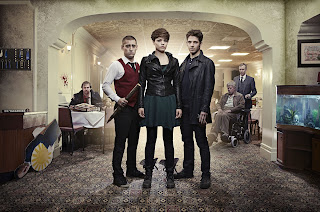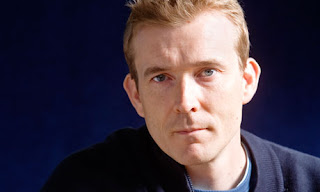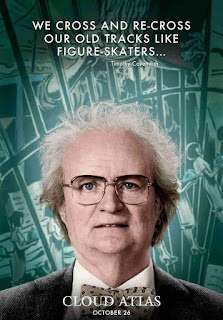Has cinema become terrified of that nasty thing we call the real world? What is the source of the current obsession with revamping fairytales? Simon Fearn investigates.
 |
There are probably many explanations. Escapism is now in vogue in an era where the Germans think its acceptable to take 40% of someone's money out of their bank account. The latest Hobbit film was a telling example of this longing to hark back to some sort of pastoral netherworld without George Osborne condemning us to increasingly depressing budgets. Perhaps people are just running out of ideas. This would explain why every October we're treated to yet another Paranormal Activity film which is a carbon copy of the last one. Perhaps fresh tales can never have the same impact as the old ones, which is why shady Hollywood film makers wish to milk the cash cows of childhood fables.
 |
| Can the opening scene of 28 Days Later be described as iconic? |
And if we're going to talk zombies, they've been attacked from every imaginable angle with varying degrees of success. We've come a long way from Romeo's iconic Night of the Living Dead, we now have the zomcom (Zombieland), zombie romance (Warm Bodies) and zombie psycho-drama (BBC3's fantastic In The Flesh). Is it just me, or did someone, someday have a good idea and everyone's just milking it for all its worth? Is it the same with fairytales?
Last year there were two films about Snow White (Mirror Mirror and Snow White and the Huntsman). It's a story about nasty fruit (which has itself been ingrained in our psyche since Eve made the mistake of listening to a talking serpent), vain women and short people. Do we honestly need two films about it? I've already talked about out obsession with vampire films in a previous article, and the idea of modern vampires all stems from a book by Bram Stoker, whose tedious use of the epistolary form bores even the most patient reader.
If we include the modern vampire story as a fairytale, then our definitions includes practically everything that's had time to sink into our psyche. The practise of allusion in novels mean that old books never quite die, and great authors will be quoting Shakespeare till kingdom come. And perhaps that's why we have this reverence for classic literature, but yet we don't share this respect for more modern books. I'm not of the belief that fiction has got worse, so why are older books considered far superior to some of the most exciting, experimental works of the 20th century?
 If pressed, I wager most of us know the basic plots to Hamlet, Wuthering Heights and Great Expectations. And they are iconic tales, beautifully crafted in such a way that every moment deserves the historic significance we give it. Unlike the fairytale adaptations that cinema is currently churning out, they were beautifully constructed with a view to telling us something about the human condition that fairytales can never quite achieve. So it seems peevish to say that they've sunk into our psyche simply because of age and constant allusion in younger texts. Indeed, Orwell's Nineteen Eighty-Four has become iconic, with big brother and room 101 sticking in our minds. But is this the way Orwell wrote his masterpiece, or simply because there have been TV shows called Big Brother and Room 101?
If pressed, I wager most of us know the basic plots to Hamlet, Wuthering Heights and Great Expectations. And they are iconic tales, beautifully crafted in such a way that every moment deserves the historic significance we give it. Unlike the fairytale adaptations that cinema is currently churning out, they were beautifully constructed with a view to telling us something about the human condition that fairytales can never quite achieve. So it seems peevish to say that they've sunk into our psyche simply because of age and constant allusion in younger texts. Indeed, Orwell's Nineteen Eighty-Four has become iconic, with big brother and room 101 sticking in our minds. But is this the way Orwell wrote his masterpiece, or simply because there have been TV shows called Big Brother and Room 101?Taking this into consideration, it's difficult to say whether iconic tales are iconic because of their individual merit or because of the constant brutalisation they receive at the hands of profit hungry morons. The latter seems to be the case when more people have heard Kate Bush's song Wuthering Heights rather than read Bronte's novel, and as a result of this Heathcliff has become some kind of rugged, tempestuous romantic hero. The song fails to mention that he murders puppies or the horrific way he treats his wife to get at Cathy. And so these elements of Heathcliff's character fail to register with many of us. This also explains the appeal of fairytales. Most of them aren't very good, but we all know them from childhood, so this explains the curious desire to see them played out on the big screen.
Those who are a fan of postmodern philosophy (and I doubt there are many of you) may be aware of a theorist called Baudrillard, who famously said that Disneyland exists to make the rest of America seem real. He believed that we're so overwhelmed by simulations (yes cinema, that does include you) that much of our experience of the real world is constructed around representations of it (how does seeing countless on screen couples say "I love you" influence how we say the famous three words). Baudrillard also said that we are desperately looking for reality as we realise everything that we thought was real is so dependant upon simulation that it can be dismissed as fake. But on this point he seemed to be wrong. We seem to have given in, let ourselves be overcome by the death of the real. When we once searched for gritty realism in our films, or social satire on the latest political outlook, now we seem to be churning over our culture, trying to remodel old ideas. It as if we're trying to worm our way into the comfortable fabric of our cultural history, scared of our future and in denial of our present. Is this just a passing fad, or is this our future? If it is, then I can see my trips to the cinema becoming more and more infrequent.



















